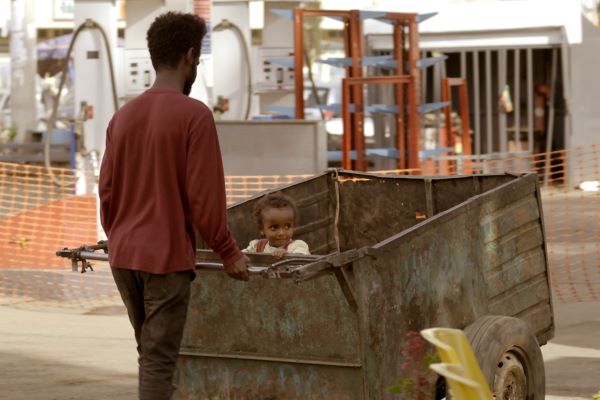First-time director Jan Philipp Weyl’s passion for Ethiopia bursts from the screen in this messy, but incredibly earnest sporting drama cum crime thriller. Opening with a stunning overhead shot of a young man running across marbled rock and lava-scarred stone, Running Against the Wind is keen to bring Ethiopia’s slightly alien beauty to the fore, yet does not shy away from the grinding poverty and the danger contained within. This collision of contrasting styles is not as uneven as one would expect, and the overall tone is refreshingly one of hope and redemption.
Two childhood friends take wildly separate paths in their attempts to make their place in the world. Solomon (Mikias Wolde) steals a camera from a visiting photographer and heads off to Addis Ababa to make his fortunes through his pilfered equipment. Unfortunately, he’s swallowed up by the capital and by adulthood he’s involved in a life of crime, in hoc to a vicious gangster who holds the safety of a wife and young daughter over him. Abdi (Ashenafi Nigusu) remains in his tiny village and devotes himself to becoming a successful runner. When he gets the change to train for a national competition in the city, the pair are ultimately reunited. Abdi tries to help his old friend, but can Solomon extricate himself from his dangerous life, or will he haul Abdi down with him?
The screenplay of Weyl and Michael Wogh attempts to split the difference between Chariots of Fire and City of God, and does this relatively successfully. Both sections indulge in the cliché of both the sports movie and the developing nation gangster film, but Weyl does an impressive job of coalescing these two disparate narratives together. The joins are still visible, especially in the first few scenes of Solomon and Abdi’s adulthood, but the friction is nowhere near as tectonic as one would expect given the pair aren’t reunited until over halfway through the film. The consistently gorgeous, vibrant cinematography of Mateusz Smolka goes a long way towards, if not complete cohesion, then at least the illusion of it. Ethiopia as viewed through his lens is a character in its own right, equally enticing, pugnacious and capricious.
The film is weighted toward Solomon’s story, which is to be expected given that it he that has the greater arc. And of the two actors, it’s clear Wolde is the more accomplished by some margin. Nigusu has a pleasant, eager-to-please demeanour which works for his single-minded devotion to running, but there are times when he’s off the track where he confused blankness for bewilderment. There are plenty rough edges on Wolde too, but he has a spiky charisma that makes his straddling of family man and hoodlum fairly convincing. Unfortunately, the running sections are the more accomplished, and fits the eventual uplifting message of the film better, complete with the requisite fist-pumping montages. The more action-orientated set-pieces feel more jarring than the scenes of Solomon’s low-level criminality.
Still, the film succeeds, albeit in a rough-and-tumble way. Weyl is occasionally so passionate about his subject that he can’t see the wood for the trees, and the narrative takes precedence over the characters that should be the focal point, but this is a rousing and enjoyable film despite the usual traps and tropes first-time filmmakers often stumble into. Thankfully, one of these tropes it admirably avoids is that of the white saviour. Weyl himself does appear as the photographer that offers Solomon a lifeline, but beyond this mentor and student relationship, it is really Solomon and Abdi that help each other become the masters of there own destiny. Very flawed, but heartfelt, visually gorgeous, and suffused with an almost guileless earnestness given the tough nature of its subject matter, Running With the Wind ultimately gets over the finish line.
Available on Blu-ray from Mon 9 Aug 2021
